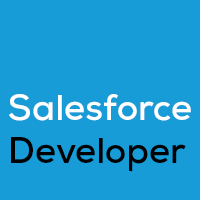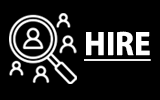Salesforce Developer Hire
Salesforce Developer Hire: The Definitive Guide to Finding and Securing Top Talent

The Salesforce ecosystem is a powerhouse for modern businesses, driving efficiency, and innovation from lead generation to customer service. Yet, the platform’s true potential is unleashed not by its off-the-shelf features, but by the customized solutions built on top of it. This is where a skilled Salesforce developer becomes an indispensable asset.
Hiring the right Salesforce developer is a critical strategic decision. It’s a key investment that can either propel your business forward with a scalable, secure, and optimized CRM or lead to costly project failures and technical debt. With the global demand for Salesforce talent soaring, the challenge is not just finding a developer, but finding the right developer who can translate your business goals into a robust, high-performing solution.
This long-form guide is crafted for hiring managers, HR professionals, and technical team leads who need to navigate the complexities of the Salesforce talent market. We will provide a step-by-step framework to ensure your Salesforce developer hire is a success, covering everything from role definition and technical assessments to budgeting and long-term retention.
1. Defining Your Salesforce Developer Hire: Role, Skills, and Certifications
A successful hire begins with crystal-clear role definition. The Salesforce ecosystem has distinct roles, and confusing them can lead to hiring the wrong person for the job.
Role Definition: Developer vs. Admin vs. Architect
- Salesforce Administrator: An admin uses “clicks, not code.” They configure the platform, manage user access, create reports, and automate simple processes using tools like Flow and Process Builder. They are essential for day-to-day maintenance but do not write custom code.
- Salesforce Developer: A developer is the coder of the ecosystem. They are responsible for building custom functionalities and integrations that cannot be achieved with declarative tools. Their work is code-first, using Apex, Lightning Web Components (LWC), and other programmatic languages. This is the role you need for complex business logic, custom applications, and system integrations.
- Salesforce Architect: An architect is the master planner. They have a deep, holistic understanding of the entire Salesforce platform and its various clouds. They design the overarching technical solution, ensuring scalability and long-term viability, and they guide the development team.
When looking for a Salesforce developer hire, be precise about what you need. Is it a full-stack coder, a front-end UI specialist, or an integration expert? A detailed job description is your most powerful tool for attracting the right candidates.
Essential Skills and Certifications
To effectively screen candidates, you must know what to look for. A top-tier developer should have a blend of technical and soft skills, backed by relevant certifications.
Technical Skills to Prioritize:
- Apex: Salesforce’s proprietary, object-oriented programming language. Proficiency in writing efficient, bulkified, and secure Apex code is non-negotiable.
- Lightning Web Components (LWC): The modern JavaScript framework for building user interfaces on the Lightning Platform. This is now the industry standard, and expertise here demonstrates a developer is up-to-date.
- SOQL & SOSL: Mastery of Salesforce Object Query Language and Search Language is crucial for retrieving data efficiently.
- API & Integration Experience: A developer must be skilled in connecting Salesforce to other systems using REST, SOAP, and Bulk APIs.
- Data Modeling: The ability to design a logical and efficient data model, including understanding relationships between objects (Lookup vs. Master-Detail).
- DevOps & Version Control: Experience with tools like Git, GitHub, and CI/CD pipelines is essential for collaborative, agile development.
Key Salesforce Certifications:
Certifications provide a baseline for a candidate’s knowledge and expertise.
- Platform Developer I: This is the foundational certification for developers. It proves a candidate has a solid understanding of the platform’s programmatic capabilities.
- Platform Developer II: This advanced certification validates a developer’s ability to tackle complex programmatic solutions. It is a strong signal of a senior, highly capable professional.
- Application Architect & System Architect: These are top-tier credentials that indicate a high-level strategic thinker.
For a successful Salesforce developer hire, prioritize candidates with at least the Platform Developer I certification and ideally the Platform Developer II for more senior roles.
2. Strategic Sourcing: Where to Find and How to Attract Top Salesforce Talent
The Salesforce talent market is competitive. To secure the best talent, you must go beyond a standard job post.
The Most Effective Sourcing Channels
- Specialized Staffing Agencies: This is often the most efficient route. Specialized tech staffing firms have extensive networks of pre-vetted, certified Salesforce professionals. They save you time and resources by providing a curated shortlist of qualified candidates who meet your exact requirements. This is a strategic way to hire a Salesforce developer with minimal risk. You can discover how our Salesforce staffing solutions can accelerate your hiring process.
- Professional Networking & Community: The Salesforce Trailblazer Community is a vibrant network of professionals. Engaging with local user groups, online forums, and community events is a great way to find passionate, engaged developers.
- Job Boards & Social Media: LinkedIn, Indeed, and Salesforce-specific job boards remain powerful tools. To stand out, your job description must be compelling and highly specific, using keywords like “salesforce developer job description” to attract the right candidates.
Crafting a Compelling Job Description
Your job post is your first impression. Make it count. A great job description should:
- Use an SEO-Optimized Title: A title like “Senior Salesforce Developer Hire” is clear and searchable.
- Sell the Opportunity: Go beyond listing responsibilities. Explain your company’s mission, the impact the developer will have, and why your team and culture are a great fit.
- Be Specific about Tech Stack: List the exact technologies you need, e.g., “Experience with LWC, Apex, and REST APIs is required.”
- Clearly State Requirements: Differentiate between “must-have” and “nice-to-have” skills and certifications.
3. The Interview Process: Questions and Assessments That Reveal True Expertise
A resume and a list of certifications are not enough. The interview process is where you must vet a candidate’s practical skills and problem-solving abilities.
Behavioral and Technical Interview Questions
- For Experience: “Tell me about a time you worked on a complex project that involved custom Apex code and multiple integrations. What were the key challenges and how did you overcome them?”
- For Problem-Solving: “Describe a situation where a piece of your code hit a Salesforce governor limit. How did you diagnose the issue and what steps did you take to optimize the code?”
- For Technical Depth: “Explain the difference between a
before insertand anafter inserttrigger in Apex. When would you use one over the other?” - For Integration Skills: “Walk me through the process of integrating a third-party application with Salesforce using a REST API. What are the key considerations for authentication and security?”
The Importance of a Practical Assessment
A live coding challenge or a take-home assignment is the single best way to evaluate a developer’s skills. This allows you to assess their:
- Code Quality: Do they write clean, commented, and efficient code?
- Problem-Solving Approach: How do they break down a complex problem into smaller, manageable steps?
- Adherence to Best Practices: Do they use proper error handling, bulkification, and security measures?
A well-designed technical assessment can provide more insight than hours of verbal interviews.
4. Understanding Cost and Models for a Salesforce Developer Hire
The cost of a Salesforce developer hire is a critical factor, but it’s not just about salary. You must consider total compensation and the long-term value of the chosen hiring model.
Key Factors Influencing Cost
- Experience Level: A junior developer’s salary will be significantly lower than a senior developer or architect’s.
- Geographic Location: Salaries vary drastically by region. Developers in major tech hubs (e.g., San Francisco, New York) command higher salaries than those in lower-cost areas.
- Hiring Model: Your choice of hiring model—in-house, remote, or outsourced—will have a massive impact on your budget.
In-House vs. Remote vs. Outsourcing
Each model offers a unique set of pros and cons.
- In-House Hire:
- Pros: Fosters strong team cohesion, in-person collaboration, and deep institutional knowledge.
- Cons: Higher cost (salary, benefits, office space), limited access to a global talent pool.
- Remote Hire:
- Pros: Access to a global talent pool, often at a more competitive rate; increased flexibility.
- Cons: Requires a strong remote culture and effective communication tools; potential for time zone challenges.
- Outsourcing/Consulting Partner:
- Pros: Instant access to a pre-vetted team of specialists (admins, developers, architects); no long-term commitment; ideal for short-term, complex projects.
- Cons: Higher hourly rates, but often lower total project costs due to efficiency and specialized expertise. This is a powerful option for businesses that need to augment an existing team or launch a critical project on a tight timeline. You can explore our different engagement models to find what works best for your project.
5. The Onboarding and Retention Playbook
The work isn’t over when the offer is accepted. Proper onboarding and a long-term retention strategy are crucial for maximizing your ROI.
- Create a Structured Onboarding Plan: Give your new hire a clear roadmap for their first 30, 60, and 90 days. This should include an introduction to your team, an overview of your Salesforce org, and a list of key stakeholders.
- Assign a Mentor: Pair your new developer with a senior team member who can help them navigate the codebase, understand your business processes, and acclimate to the company culture.
- Foster a Culture of Continuous Learning: The Salesforce ecosystem is constantly evolving. Support your developers by funding their continued education, encouraging them to pursue advanced certifications, and allowing them to attend industry conferences and events. This keeps their skills sharp and shows your commitment to their professional growth.
By focusing on these elements—from a strategic Salesforce developer hire to long-term career investment—you build a loyal, high-performing team that will drive sustained value for your business.

Making the Right Salesforce Developer Hire
Navigating the process of a Salesforce developer hire requires a blend of technical understanding, strategic planning, and a people-first approach. By clearly defining your needs, knowing where to source top talent, conducting a thorough assessment, and selecting the right hiring model, you can confidently build a team that will unlock the full potential of your Salesforce investment.
Remember, a great developer isn’t just a coder; they are a problem-solver, an innovator, and a key partner in your company’s success. Your strategic hire today will pay dividends for years to come.
Ready to Make Your Next Strategic Salesforce Developer Hire?
Don’t let the complexities of the Salesforce talent market slow you down. Our specialized staffing agency has a proven track record of connecting companies with top-tier Salesforce developers who are ready to make an immediate impact.
Contact us for a consultation or quote to get started on your journey to hiring the perfect Salesforce professional.
Are you in need of a highly skilled Salesforce Professional?
GET STARTED with our free Client Solution Manager consultation
OR


